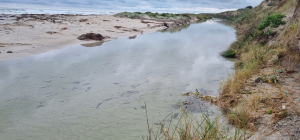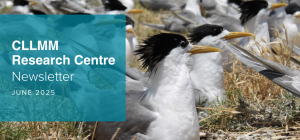
As reported in August 2021, the Intergovernmental Panel on Climate Change (IPCC) released its latest report on climate change − highlighting that our climate is changing, with projections for southern Australia including a reduction in mean rainfall, an increase in the frequency of droughts, along with sea level rise. For the Coorong and Lower Lakes region this is likely to include increases in air and water temperatures; changes to surface water, groundwater and seawater inflows; and changes to the size, frequency and duration of droughts and flood regimes. These impacts are likely to continue to drive change in the ecology of the system, which, if not managed appropriately, could affect the region’s important cultural, environmental, economic and social values.
This article is the latest in a series of In Focus articles published in the Goyder Institute eNews on the Goyder Institute-led research being delivered as part of the $77.8 million Healthy Coorong, Healthy Basin (HCHB) Program. This initiative of the Australian and South Australian governments aims to support the long-term health of the Coorong by providing evidence-based solutions to both immediate threats and future conditions under a changing climate. The Goyder Institute for Water Research is the delivery partner for research components of HCHB, providing independent research to inform future management decisions for the region.
In this issue, we explore the Climate Adaptation Component led by Dr Michael Dunlop from the CSIRO.
While decision makers are managing the current pressures acting on the Coorong and working to maintain its ecological character, this research is aiming to ensure that preparations are being made to anticipate and effectively prepare for and manage the Coorong as climate change unfolds, such that it continues to support the livelihoods and well-being of local business, communities and First Nations.
“The Coorong and Lower Lakes is a region of immense cultural, environmental, economic and social value” said Dr Dunlop. “Climate change is happening, and its impact will result in changes to the local environment and ecology, which in turn may affect how communites and First Nations interact with the region” he said.
“Through this Healthy Coorong, Healthy Basin Climate Adaptation project, we are looking at the possible changes that may be observed in the region over the next 50 years, and what the needs are of decision makers facing the potential of transformative climate change” said Dr Dunlop. “This requires exploring the nature of future adaptation decisions and examining the consequences for current decision making” he said.
“The main drivers of change over the next 50 years in the Coorong and Lower Lakes region resulting from climate change are likely to be decreased freshwater inflows from the River Murray, Eastern Mount Lofty Ranges and the South East; increasing sea level; and warming of land and water. These will lead to changes in the region’s ecology” said Dr Dunlop. “For example, rising sea levels may permanently inundate some current mudflat habitat that is important for sustaining the high abundances of wading birds for which the Coorong is internationally renowned, but it may also create new mudflat habitat elswehwere in the system” he said. “More frequent and prolonged low flows from the River Murray may lead to reductions in water levels in the Lower Lakes, fewer opportunities to provide regular freshwater flows into the Coorong and less connectivity for species of fish which move between the ocean and the Lower Lakes and River Murray as part of their life cycle” he said.

As an initial step, Dr Dunlop’s team have been working closely with the South Australian Department for Environment and Water (DEW) and the Goyder Institute to examine current management and research activities and how they are expected to contribute to achieving the current management objectives for the Coorong.
“Using a methodology called ‘Theory of Change’, we have been able to identify the connections between multiple management activities and other interventions affecting the Coorong and Lower Lakes and the desired outcomes identified for the region” said Dr Dunlop. “This has led to defining a number of narratives about how change has previously occurred in the region. For example, the region’s social-ecological system is complex and ever-changing, with long histories of First Nations’ connections. More recently there has been ongoing evolution of agreements, institutions and First Nation voice and empowerment. At the same time, there have been a multitude of management actions of the state and national governments, such as The Basin Plan, river operations, environmental flow management and the management of South East flows, which have all had an impact on the region” he said.
“One key area has become clear from our research” said Dr Dunlop. “that the Coorong and Lower Lakes system could change in novel ways as the impacts of climate change are observed” he said. “ By examining how vulnerable key ecological and social elements and decision-making processes are to future scenarios and trajectories of change, we can develop an understanding of the pathways for adaptation of the region to ensure the region continues to support its value to the community”.
Over coming months, the Climate Adaptation team will continue to work towards identifying some preliminary adaptation pathways for the Coorong and Lower Lakes region.
More information on the HCHB Climate Adaptation Component can be found here. For further information on the Goyder Institute-led HCHB research, please contact Dr Alec Rolston.

This project is part of the South Australian Government’s Healthy Coorong, Healthy Basin Program, which is jointly funded by the Australian and South Australian governments.


